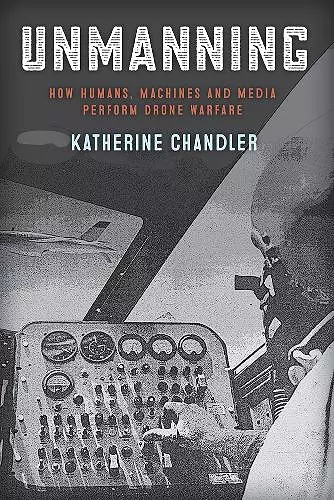Unmanning
How Humans, Machines and Media Perform Drone Warfare
Format:Paperback
Publisher:Rutgers University Press
Published:13th Mar '20
Currently unavailable, and unfortunately no date known when it will be back

Unmanning studies the conditions that create unmanned platforms in the United States through a genealogy of experimental, pilotless planes flown between 1936 and 1992. Characteristics often attributed to the drone—including machine-like control, enmity and remoteness—are achieved by displacements between humans and machines that shape a mediated theater of war. Rather than primarily treating the drone as a result of the war on terror, this book examines contemporary targeted killing through a series of failed experiments to develop unmanned flight in the twentieth century. The human, machine and media parts of drone aircraft are organized to make an ostensibly not human framework for war that disavows its political underpinnings as technological advance. These experiments are tied to histories of global control, cybernetics, racism and colonialism. Drone crashes and failures call attention to the significance of human action in making technopolitics that comes to be opposed to "man" and the paradoxes at their basis.
"Drone theory tends to replicate the god's eye view enjoyed by its object. Katherine Fehr Chandler bucks this trend, grounding her new theory of 'unmanned' aerial vehicles in their wayward and failure-ridden history as human–machine–media assemblages. The effacement of that history, Chandler argues, is what allowed drones to assume their current role: as sleek, agential means for disavowing both the responsibility of their wielders and the humanity of their targets. Unmanning is a timely and fascinating book."— Paul K. Saint-Amour, author of Tense Future: Modernism, Total War, Encyclopedic Form
"Unmanning makes a useful contribution by dispelling the illusion of unmanned warfare. Central to this illusion are the 'politics of disavowal.' The very term 'unmanned' is a disavowal, or an attempted negation, that separates the human, machine, and media components of drone technology. Moreover, it disconnects machine action from political accountability to create a veneer of deniability and non-attribution."— Technology and Culture
"As the iconographic technologies of drone warfare become history and more secretive, varied, and autonomous technologies take their place, critically examining the long history of failure that led to the unmanning of war is an urgent task that Chandler's book meets head-on and with an accuracy and efficacy that her objects of analysis fell far short of achieving."— Cultural Studies
"This book makes a much-needed intervention into the popular discourses that surround drone warfare today. Drawing on extensive archival research, Unmanning offers detailed histories that deconstruct the most persistent mythologies of air war in general and automated and distance weaponry in particular to offer completely new perspectives on one of the most significant technological trends in contemporary warfare."
— Caren Kaplan, author of Aerial Aftermaths: Wartime from Above
"In Unmanning, Katherine Chandler offers a compelling history of the drone that complicates and deepens our understanding of what is at stake in the performative rhetoric that fuels the automation of US military air power. This book is an invaluable resource for everyone concerned with the erasures of human agencies that enable claims for technical autonomy in contemporary warfighting."— Lucy Suchman, author of Human-Machine Reconfigurations
"Chandler's book both invites the wider geographical deployment of this approach and reminds us that while contemporary drone development and discourse so often appear future-orientated, much can be learned from the platform's plural histories."— Law, Culture and the Humanities
"While focused primarily on drone warfare, Chandler's book – in its investigations into failure, human/machine relations, and threat production – points perhaps also to ways of thinking about how politics is denied and disavowed in other techniques of state violence like policing."— Security and Dialogue
"[I]f there is a lesson to be learnt from Chandler's brilliant book it is that the arc of the drone bends not toward justice, but failure, and contemporary experiments in drone warfare that fail do not so much crash, go haywire, or plummet into the sea. Instead, they maim, kill, and destroy, and disavow these acts as techno-mechanical progress."— Antipode Online
ISBN: 9781978809741
Dimensions: 229mm x 152mm x 15mm
Weight: 2g
190 pages